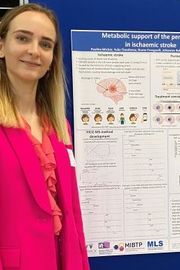Neurosciences
Latest Research
Research Archive
- Research articles from 2025
- Research articles from 2024
- Research articles from 2023
- Research articles from 2022
- Research articles from 2021
- Research articles from 2020
- Research articles from 2019
- Research articles from 2018
- Research articles from 2017
- Research articles from 2016
- Research articles from 2015
- Research articles from 0
Investigating circadian effects in the treatment of stroke
Stroke is caused by a sudden occlusion of a brain supplying artery, for instance by a blood clot. Stroke is a leading cause of mortality and disability in the UK and worldwide. Stroke survivors can experience limb paresis, fatigue, pain, speech and language problems, vision problems, and other deficits dependent on many factors, such as stroke location. Despite decades of extensive research in the field of ischaemic stroke, there are just two approved treatments so far, both aimed at reopening the occluded blood vessel. Both therapies have severe limitations though and additional treatments are strongly needed.
Interestingly, stroke does not occur randomly throughout the day, but is most frequent in the morning, at the beginning of the human activity phase. This implies that circadian rhythm affects factors, such as blood pressure, that contribute to stroke. However, investigation of new therapies for stroke is mainly done in nocturnal rodents. Most of the work happens during the day (animals’ resting phase). New research suggests that new therapies are not as effective when administered during night-time (animals’ activity phase). This might contribute to the so far lacking translation of experimental treatments into clinical routine.
Stroke is a medical emergency and must be treated when it occurs. However, the possible circadian effects of stroke treatment administration need to be investigated and could have direct influence on future clinical trials design.
In this Medical and Life Sciences Research funded project, Ms. Paulina Michór, working with colleagues at the University of Warwick will investigate if outcomes of a new experimental stroke treatment supporting brain metabolism during stroke are differently effective during day- and night-time.



